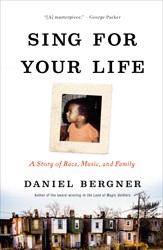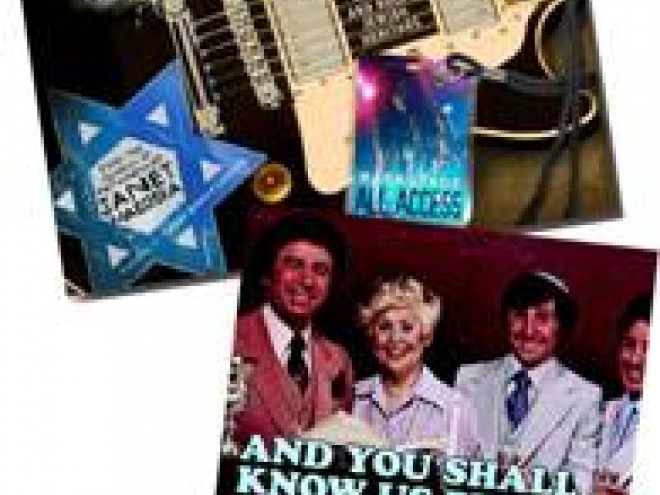Tamar Barzel’s first book, New York Noise: Radical Jewish Music and the Downtown Scene (Indiana University Press, 2014, with a companion website with audio/video), explores the strange and compelling Jewish music that emerged from Manhattan’s downtown scene of the 1990s. She will be blogging here all week for Jewish Book Council’s Visiting Scribe series.
 A few nights ago, by some very circuitous means I need not go into here, an e‑mail from someone famous popped up in my Inbox. Well, maybe not famous. More like well-known. More to the point, even though I had never met this person before, I had always looked to his/her work as a source of great joy, solace, and penetratingly weird truths about life. As it turns out, this person’s family was known by someone who I had recently bumped into. When she found out that I was an admirer of her famous family friend, one thing led to another and she sent him/her (the famous person) a link to my book. So this brilliant person’s e‑mail appears in my Inbox. And it says, “tell her [i.e., me] that her book looks like a brilliant work of life-changing genius.” ok…I’m paraphrasing here. She did say it looked interesting, though. And then: “I loooove klezmer music.”
A few nights ago, by some very circuitous means I need not go into here, an e‑mail from someone famous popped up in my Inbox. Well, maybe not famous. More like well-known. More to the point, even though I had never met this person before, I had always looked to his/her work as a source of great joy, solace, and penetratingly weird truths about life. As it turns out, this person’s family was known by someone who I had recently bumped into. When she found out that I was an admirer of her famous family friend, one thing led to another and she sent him/her (the famous person) a link to my book. So this brilliant person’s e‑mail appears in my Inbox. And it says, “tell her [i.e., me] that her book looks like a brilliant work of life-changing genius.” ok…I’m paraphrasing here. She did say it looked interesting, though. And then: “I loooove klezmer music.”
Now, this was interesting to me. The word “klezmer” doesn’t appear anywhere on my book cover, blurbs, or anything else that would have been available at the time. But the power of association was strong enough that the title phrase, “Radical Jewish Music,” scanned, for this person, as klezmer. And that was ironic, because I once had a long chapter about klezmer in the book, which I ultimately took out because it no longer seemed that timely. I had written the chapter in the first place because in the early 2000s, when I was doing the first research for the book, every time I told someone what I was writing about, in a no doubt very convoluted way, there would be a pause, and then a light would dawn on their faces and they would say, “Oh, you mean klezmer?” And when I said no, everyone got confused again. Klezmer, which was everywhere in those days at the height of the klezmer renaissance, was easy to assimilate. Secular Jewish music that wasn’t klezmer, that was in fact in some ways anti-klezmer, was harder. When the musicians I write about were first getting it into their heads to make what I have come to call “Jewishly usable music,” they were invariably asked the same question. And the answer, again, was no. What they were doing, in fact, was investigating how to do new Jewish music without klezmer.
Some other musicians, though, felt a bit hemmed in by the assumption that if they were going to do Jewish music, it would have to be klezmer. They’re experimentalists, and they’re iconoclasts. They wanted to make some weird new Jewish music, and they wanted to do it in their own downtownish way. (Check out Shelley Hirsch’s O Little Town of East New York, John Zorn’s Masada Live in Jerusalem, and Anthony Coleman’s The Abysmal Richness of the Infinite Proximity of the Same.) Ultimately, I came to understand that they wanted their music to do some cultural and emotional work that they felt klezmer couldn’t do. As Coleman wrote in the liner notes to one of his recordings with the band Sephardic Tinge (a reference to Ferdinand “Jelly Roll” Morton’s famous phrase about jazz’s “Latin tinge”), “Poor klezmer! A music which most of us never heard until the mid- to late-70s has to stand for a completely hybrid and fragmented culture — New York Jewish Culture.” What did they come up with in its place…? That’s really what the book is about.
Still, I’m framing the e‑mail.
Tamar Barzel is an ethnomusicologist and lecturer at Harvard University whose research addresses the interface between creative identity, cultural heritage, and adventuresome sounds. She is currently immersed in fieldwork on the creative improvisation scene in Mexico City.
Related Content:
- Reading List: Music and Jews
- Essays: Jews, Sports, and Music
- Klezmer America: Jewishness, Ethnicity, Modernity by Jonathan Freedman
Tamar Barzel is an ethnomusicologist and lecturer at Harvard University whose research focuses on experimental music, with an emphasis on late twentieth-century jazz and the Jewish avant-garde.



